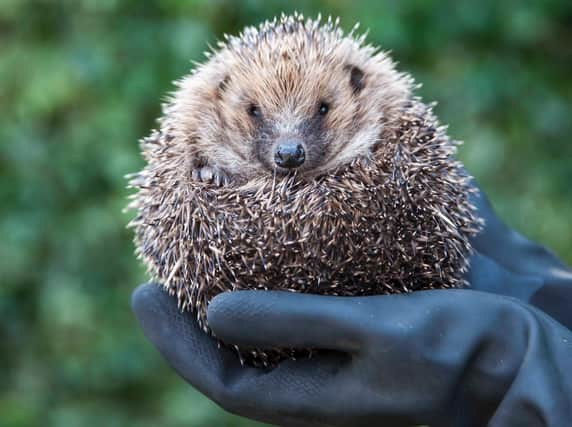Making gardens wildlife friendly can help hedgehog survival


Loss of habitat and road deaths are indicated as the main drivers behind the large decline in hedgehog numbers, with a survey carried out by PTES in 2018 indicating a drop of 30 per cent in urban areas, rising to up to 50 per cent in the countryside – primarily due to a loss of hedgerows and field margins.
To mark National Hedgehog Week, which runs until Saturday, charities are raising awareness of how we can help the UK’s only spiny mammal’s fight for survival.
Advertisement
Hide AdAdvertisement
Hide AdEmma Farley, who runs Little Silver Hedgehog rescue in York, said it was all down to habitat and people can help just by putting a gap in their garden fencing.
“The decline in hedgehogs is largely due to habitat loss. Hedges have been ripped out, gardens are fenced in and we use pesticides which has killed off a hedgehog’s preferred food source of caterpillars and beetles,” she said.
Ms Farley, who has been running the Little Silver Hedgehog Hospital for seven years, said as well as more housing developments taking away natural habitats, the way we look after our gardens can cause problems for wildlife.
She said: “Hedgehogs need to roam in order find food. To find enough to eat a hedgehog may need to visit around 20 to 30 reasonably sized urban gardens, but a lot of gardens now have solid fencing which means they can be penned into areas and unable to find enough food or, importantly for this time of year, a mate.
Advertisement
Hide AdAdvertisement
Hide Ad“In some cases gardens are paved over or the cover hedgehogs need such as piles of leaves, longer grass or log piles are removed,” she said. “I have also had hedgehogs brought to me with injuries from garden equipment such as mowers and strimmers.”
Ms Farley, who campaigns for a better understanding of how to help hedgehogs, said the use of pesticides and herbicides had caused real problems as it kills off their primary food source.
“Hedgehogs are known for eating garden grubs such as snails and slugs but they are quite far down a hedgehog’s preferred diet list,” she explained.
Caterpillars and beetles are the best food for hedgehogs but people do not want them on crops or eating vegetables.
Advertisement
Hide AdAdvertisement
Hide Ad“Getting rid of them may save our veg plots but it also means hedgehogs have to look further down their list of food sources and eat what is left,” she said.
“Slugs and snails carry parasites which they pass onto hedgehogs and if a hedgehog is small or has an injury the parasites can really compromise their immune system. The issue I deal with most is internal parasites.”
Ms Farley works alongside a vet to provide critical care to the hedgehogs. She said being in captivity was very stressful for the hedgehogs and she worked to get them back out into their natural environment as quickly as possible.
“I provide the equivalent of intensive care for very poorly hedgehogs and it takes a lot of work,” she said.
Advertisement
Hide AdAdvertisement
Hide Ad“The minimum length of time for a stay is three weeks and they can’t be released until they have reached a sufficient weight to be able to survive.
“My aim is to help prevent hedgehogs needing treatment in the first place rather than putting a sticking plaster over the problem.
“We can all do small things to help this happen, like putting a gap in fencing, putting down a shallow bowl of water and being aware of the wildlife sharing our green space.”
The British Hedgehog Preservation Society is running a national campaign to help make gardens hedgehog friendly.
Advertisement
Hide AdAdvertisement
Hide AdEditor’s note: first and foremost - and rarely have I written down these words with more sincerity - I hope this finds you well.
Almost certainly you are here because you value the quality and the integrity of the journalism produced by The Yorkshire Post’s journalists - almost all of which live alongside you in Yorkshire, spending the wages they earn with Yorkshire businesses - who last year took this title to the industry watchdog’s Most Trusted Newspaper in Britain accolade.
And that is why I must make an urgent request of you: as advertising revenue declines, your support becomes evermore crucial to the maintenance of the journalistic standards expected of The Yorkshire Post. If you can, safely, please buy a paper or take up a subscription. We want to continue to make you proud of Yorkshire’s National Newspaper but we are going to need your help.
Postal subscription copies can be ordered by calling 0330 4030066 or by emailing [email protected]. Vouchers, to be exchanged at retail sales outlets - our newsagents need you, too - can be subscribed to by contacting subscriptions on 0330 1235950 or by visiting www.localsubsplus.co.uk where you should select The Yorkshire Post from the list of titles available.
Advertisement
Hide AdAdvertisement
Hide AdIf you want to help right now, download our tablet app from the App / Play Stores. Every contribution you make helps to provide this county with the best regional journalism in the country.
Sincerely. Thank you.
James Mitchinson
Editor
Comment Guidelines
National World encourages reader discussion on our stories. User feedback, insights and back-and-forth exchanges add a rich layer of context to reporting. Please review our Community Guidelines before commenting.